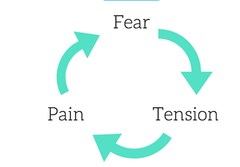Childbirth... Is It Really That 'Painful'?

I was a midwife when I had my children, so I had a fair base knowledge of what labour and birth were all about. In those days, antenatal education consisted of hearing about all the things that could go wrong. And showing of instruments that looked like they came out of the dark ages. I had loads of experience from the carers perspective, but nothing personal from the labouring woman's perspective. I did know (thanks to a wonderful woman-focused midwife I trained under) that it was important for the soon-to-be mother to feel well supported and informed every step of the way. I had good labours in the big scheme of things, and even with that, I know that if I were having my children today, I would do things very differently. Different time, different ways... the most wonderful thing about time, is we can learn and grow.
I remember as a young trainee midwife, looking after a lovely lady who was doing so well. I was holding her hand and the conversation went something like this: Woman: 'Nurse, this hurts SOOOO much, it's so painful". Me: "I know, but YOU are doing SO well, it won't be long now." Woman: "Have you had babies Nurse?" And these were the words that effortlessly and with genuine authenticity flowed freely from mouth... "No, but I have experienced extremely severe period pain."
EXTREMELY SEVERE PERIOD PAIN!What the hell was I thinking... Period pain... OMG!
Fast forward ten years or so, and I understood what she was talking about. That conversation came flooding back, and I distinctly remember thinking what an absurdly ridiculous statement that was to make! Fast forward another number of years and I now know that PAIN (as in 'labour pain'), is something very different to what we believe, what we perceive and what we are told by the well-meaning sharers of the birth stories. Grantly Dick-Read in his book "Childbirth Without Fear" states "There is no physiological function in the body which gives rise to pain in the normal course of health." Taking into consideration that childbirth is a normal and natural function for a woman, it stands without reason that technically speaking 'pain' as is often described to us, can be an exaggeration. Now my Mum had quick labours, so I had a strong belief that I too would have quick labours... and I did (well first time around anyway). But I also had a strong belief that I had a low pain threshold... and of course I experienced lots of pain. Fortunately for me, the course of action I chose, in the form of an epidural (insert choir of angels singing upon the relief I got), did not have any of the adverse effects that I now know about, and that I have so very often witnessed other labouring women experience. So what is this thing called 'pain'? Early writings about labour and birth have no mention of the pain of labour. Labours back in two-thousand-and-froze-to-death where usually straight forward and relatively short. It wasn't really until the Elizabethan times that natural birth started to go hay-wire (I think I'll keep that story for another post). We all know that the calmer & more relaxed we are, the better we feel. And this is no different in labour. When you are calm and relaxed, the endorphins are flowing, which makes you even more relaxed, so you have a heightened sense of well-being, calmness and inner peace. In this state, you are able to cope with the surges (contractions) of labour, letting them rise, peak and pass. Then you rest and recover. The problem comes when fear is allowed to creep in. Fear can come from any source... talk of 'delays in progress', language, stories you've been told, heard, or read about... there is any number of sources to induce fear. Once fear rears it's ugly head, stress hormones start to flow because the mind perceives there is a threat or danger and responds accordingly, to protect you from said perceived threat or danger. When we are in this protective or fight/flight mode, blood is diverted to the defence organs... of which the uterus is not... the body tenses, and pain is peaking. Allowed to continue, there is excessive tension within the uterus, which causes further pain. Then you have restriction of blood flow to the uterus, which means decreased oxygen (muscles need oxygen to work effectively), which results in reduced oxygen to baby... and before you know it baby becomes distressed.... insert more fear/more danger... ending in intervention or emergency caesarean.

This cycle is what Grantly Dick-Read refers to as the Fear-Tension-Pain Syndrome, which not only explains the origins of the discomforts of normal labour, it also gives way to a simple method of avoiding severe pain. And that is to remove fear. By removing fear, tension is reduced, and therefore pain minimised. Now I'm not saying labour is going to be pain-free - although I know women who have stated having a tooth extraction has been more painful than giving birth... clearly they haven't experienced sever period pain either! What I am saying is that by maintaining a deep level of relaxation during labour, you allow endorphins to flow (feel good hormones AND 20 - 40 times more powerful pain relief than morphine), which prevents tension within the uterus and allows for the normal progress of labour to continue. In preparation for your birthing day, do yourself a BIG favour and learn the art of deep relaxation (self-hypnosis), develop a calm positive mindset and practice strategies that will allow you to maintain this mindset throughout. Release any fear, worry or concerns you may be experiencing or holding on to. Even if things do take a detour, you will be way better equipped to cope, feel confident in your choices, and trust your ability, your body and your baby to birth. You will be empowered and feel in control of something that is natural, intuitive and that you were hard-wired to do. If you would like to release any fears you may be holding around labour and birth, you can book your 'Fear Release for Birth' sessionHERE. To find out more on how to best prepare for birth check out theHypnobirthing page.
Join the Private Facebook Group for daily self-care and confidence tips, resources, and the Monthly Live Meditation sessions.


